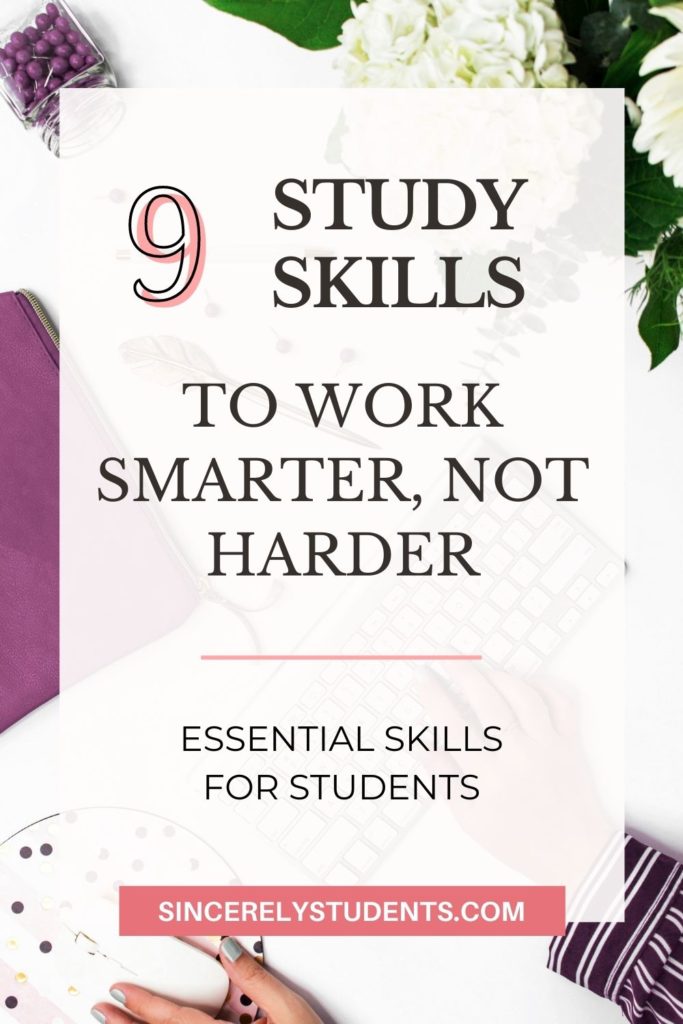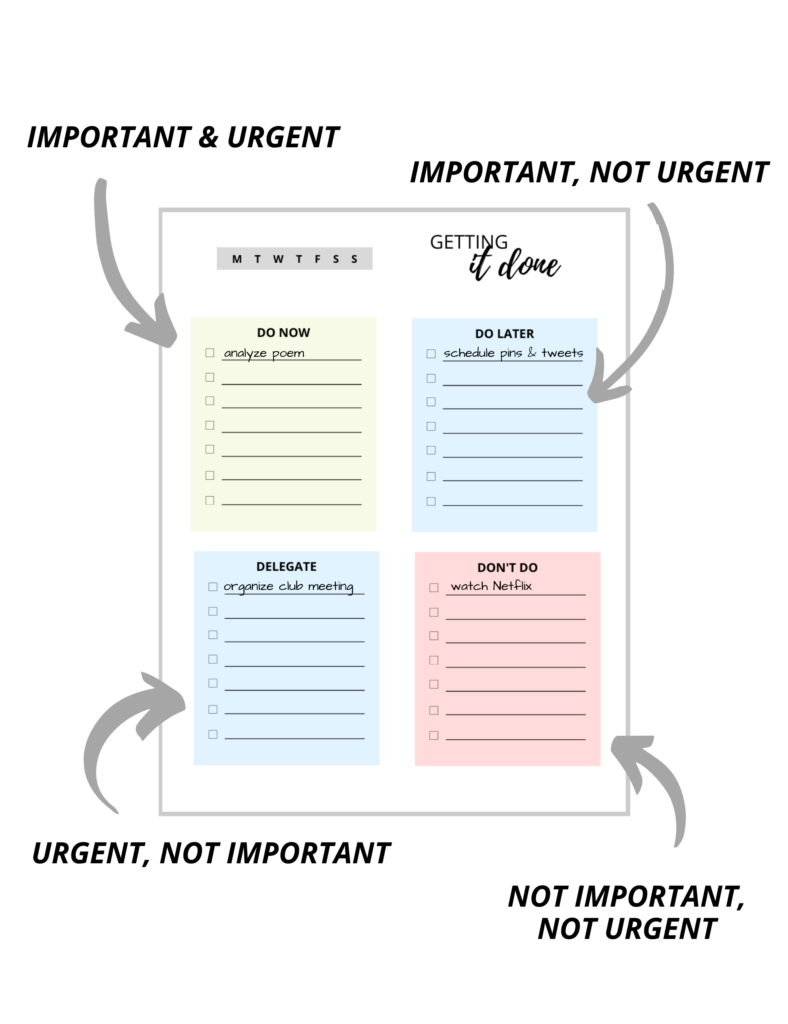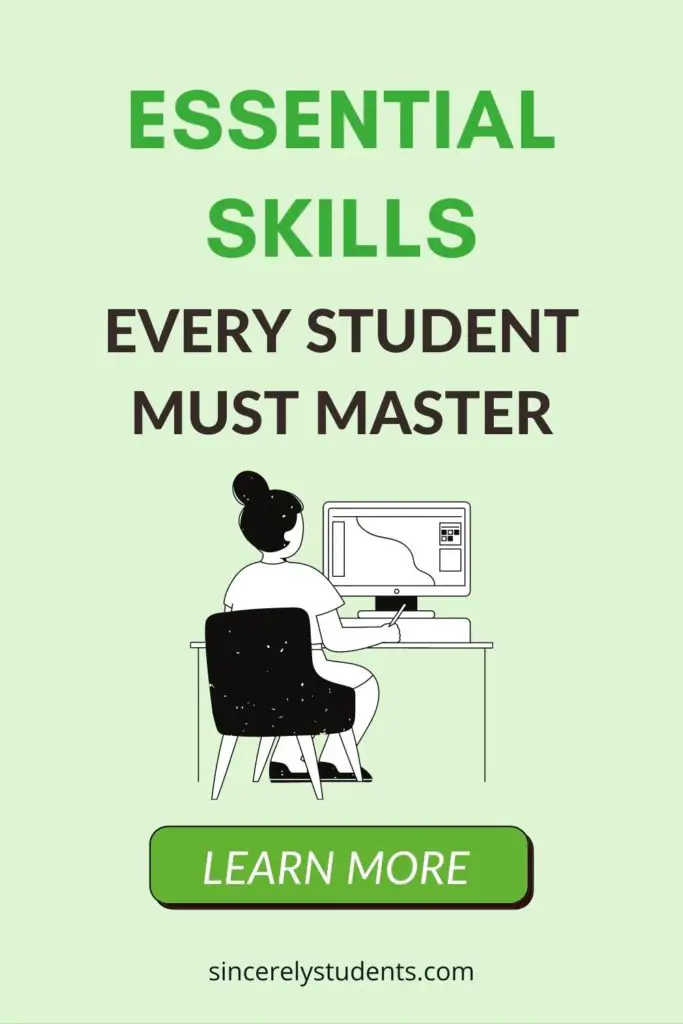Have you noticed how some people just seem to thrive in school? They understand every concept that’s taught, never miss an assignment, and are– all-in-all– great students.
The truth is, no one is born a perfect student. Instead, they learn certain skills and habits to help them study more effectively. By building these skills, they are working smarter and not harder.
In this post, I’ll teach you 9 essential study skills every student should know. If you’d like to become a better student today, then keep reading!

Notion Template for Students
Before we get started… want to get your life organized as a student?
Check out my Ultimate Student Planner Notion Template!
This easy-to-use Notion template will save your life as a student.
Use the right study supplies
Now onto the study skills!
First things first, the foundations: your study supplies. It’s important to have the supplies you need in order to maximize your study efficiency.
Every student has their own set of supplies that help maximize success. Here are some of mine, as well as a few that will help you implement the best practices I’ll be teaching you in this post:
- Academic planner: As you’ll read about soon, planning ahead is a skill every student must build! Use a planner to keep track of important dates and progress tasks.
- Index cards/flashcards: Flashcards can make memorization much easier! Use flashcards to practice memorizing terms and concepts.
- Pilot G2 black pens: High-quality pens will come in handy when writing anything, and the Pilot G2 pens are super trustworthy!
- Mildliner highlighters: Use colored highlighters to color code anything you want and emphasize important concepts and words in your notes.
Prioritizing assignments
Knowing how to prioritize is an essential skill, and not just for students. Whenever you face a to-do list, you should immediately know which tasks should be the top priority, and which ones can wait.
If you tend to struggle with this type of decision-making, try using the Eisenhower Matrix to organize your tasks. It looks like this:

In each of the quadrants, you can categorize tasks based on their importance and urgency. This will help you sort out which tasks to do first, which to do later, which to delegate to others, and which to not do at all.
Some students may have no trouble prioritizing, they just struggle to actually get started. If you tend to procrastinate on your to-do list, you may find this guide helpful:
Working under pressure
I’m sure that sometime in your life, you’ll have to take a formal assessment. In fact, it’s very likely that you’ll have to take many of them! If you haven’t yet mastered the skill of working effectively under pressure, it’s time to start practicing.
A testing environment is different from your casual classroom; it is tenser and can put a lot of invisible pressure on the students in the room. Because of this extra stress, students can find themselves losing concentration easily, struggling to recall information, and developing sudden physical symptoms of anxiety.
It’s never fun to experience these problems, especially if you’re trying to do well on a test. Therefore, you must practice working under pressure.
At home, take mock exams in a test-like environment. This means that you should:
- Be in a silent or quiet room with no music, family members, friends…
- Have no distractions like your phone and games
- Use no outside resources like your notes and the textbook
- Time yourself with a stopwatch or timer
Effective reading
You may or may not be familiar with reading textbooks. Often, especially as you graduate high school and step into college, you’ll have to rely almost completely on reading textbooks to learn.
In this case, you’ll want to practice effective reading skills. It’s extremely common for students to read an entire chapter but end up not understanding or remembering anything. This is not effective and is a terrible habit that must be broken.
Instead, try the following:
- Don’t just dive into the section you have to read. Preview the contents, such as headings, highlighted concepts, and important vocabulary.
- Take notes while reading, but only on the relevant information that you didn’t already know. Include diagrams and draw connections!
- Review your notes around 8 hours after you finish reading the section.
- Discuss what you’ve read with a friend and resolve any potential confusion.
YOU’LL LOVE THIS POST: 8 Daily Habits Of Highly Successful Students
Reviewing knowledge
Just like I mentioned in the above tip, reviewing what you’ve learned is important; it may help you clear any questions you had, form new connections, and understand concepts in ways you hadn’t realized before.
An effective reviewing method is to review:
- 8 hours after first learning the information.
- Another 8 hours later (16 hours after learning it).
- Another 8 hours later (24 hours after learning it).
Having well-organized and informational notes is incredibly helpful while reviewing. You can read through your notes, remake the connections you made earlier, and practice applying the concepts you learned to realistic scenarios or relevant questions.
Memorization & application
Speaking of applying concepts, knowing when and how to memorize information and when to practice applying them is another essential study skill. Some subjects require a lot of memorization, others focus on applying what you already know in new ways, and many are a combination.
Here are some examples:
- In math, you need to memorize formulas and apply them to problems.
- In languages, you need to memorize grammar and conjugation rules and apply them when writing, speaking, etc.
- In science, you need to memorize laws and formulas and apply them to scenarios.
- There are many more examples, but you get the point!
Therefore, practice memorizing information (try flashcards and interactive apps like Quizlet), then do a lot of practice problems where you have to apply the information you learned!
For many subjects, you can find practice problems in your textbook. You can also find videos on YouTube that guide you through a certain topic and a few practice questions.
CHECK THIS OUT: How To Motivate Yourself To Study When You Don’t Feel Like It
Set & follow routines
An essential study skill that will help you complete your to-do list more effectively is to built and follow routines. Many students have morning and evening routines, but not necessarily a study routine.
A study routine is just like any other routine; you make a set schedule to study all the subjects you need to and follow it regularly. Schedule blocks of time during which you study one specific subject and repeat for every task you must complete.
A helpful way to follow this routine every day without feeling forced is to implement it into your daily routine. Every day at around the same time, sit down and begin your study routine. This will ensure that you not only make time to study every day but that you make enough time to do so!
If you’d like some extra help maintaining your study routine, feel free to download my free study session planner (and many other printables) from my Freebie Library!
Collaborating with others
Each student has different preferences for studying environments; some like to study alone in a quiet room, while others like to be with a group in a public library or café.
If you’ve been studying alone in your student career, why not try joining a group study session and see how it works for you? Collaboration, especially with students who are studying the same thing as you, can be incredibly helpful.
Your friends can help you stay focused and productive, answer questions you may have had, and introduce new ideas and perspectives that help expand your understanding of a concept.
If you’re currently an online student and attend virtual classes, you can still hold virtual study calls! Simply make a group chat and FaceTime, or use apps like Zoom, Discord, and Houseparty to do the same.
Planning ahead
Last but not least, every student should build the essential skill of planning ahead. At the beginning of every school year, every semester, and even every new unit for a class, take out your planner and get planning.
Take note of test dates, project due dates, and other important days for each class. Feel free to customize your planner however you’d like to maximize its effectiveness for you, such as color-coding each class and using certain symbols.
In addition to marking down important dates, you should also make progress tasks! This means setting short-term goals and to-dos that you will practice regularly leading up to that test date.
This method of planning ahead – noting tests in the future and paving a path of studying leading up to that date – is highly effective in helping you prepare fully and not cram. Try it out!
Conclusion
I hope you learned something new from this post and can start implementing these study skills immediately! With consistent practice, you’ll be on your way to becoming a better student!
If you found this post helpful, you’ll love these:
- 7 Terrible Study Habits To Quit Immediately
- 9 Powerful Daily Habits For Productivity
- The Ultimate Student Guide To Effective Monthly Planning
